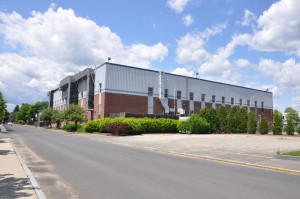
Calare Properties is in talks with various tenants from light-industrial companies to retailers about leasing Building 16 at the former Avery Dennison complex in downtown Framingham.
What do you do with an old, single-story manufacturing facility stuffed to the brim with ancient industrial equipment, pipe fixtures and lab materials?
Calare Properties of Hudson had one solution at a 67,000-square-foot industrial property in downtown Framingham: empty it out, refurbish the structure and turn it into a new craft brewery and restaurant.
The Clinton Street property, previously home to packaging company Avery Dennison, has been reinvented as Jack’s Abby Craft Lager, with a 200-seat beer hall and restaurant that pulls in thousands of customers each week.
Calare executives intend to duplicate the project’s success on another former Avery Dennison facility on Clinton Street. The 63,000-square-foot structure is being emptied out and gutted, and Calare CEO Bill Manley is confident it will be leased out soon to a new anchor or possibly multiple tenants.
Calare’s investment in the old Avery Dennison complex is part of what Framingham officials hope will be an eventual wave of projects that revitalize its rough-around-the-edges downtown, a once-bustling urban setting that has fallen on hard times in recent decades. There have already been some recent improvements to the downtown, such as the renovation of the old H.H. Richardson train station into a popular eatery called the Deluxe Depot Diner.
But town officials are hoping for much more. The goal: To make the downtown a true transit-oriented, mixed-use hub that attracts young workers and residents alike.
Bill Pezzoni, a commercial real estate attorney and a member of the 495/MetroWest Corridor Partnership, a regional business group, said he’s optimistic that Framingham’s downtown will eventually take off.
“It will take time,” said Pezzoni, a partner at Day Pitney LLP. “It’s going to be a work in progress. But I’m convinced Framingham’s downtown is poised for growth. It’s going to work and it’s going to help the regional economy.”
A Play To Capture Transit-Oriented Development
Town officials have sought to capture economic benefits from Framingham’s busy downtown station on the MBTA’s Framingham/Worcester commuter rail line.
In February, Attorney General Maura Healey approved Framingham’s new downtown zoning bylaws that were enacted by town meeting in October. Designed to encourage redevelopment of 40 parcels within a 10-minute walk of the train station, the new zoning allows buildings up to six stories. It also streamlines permitting processes and allows multifamily housing above ground-floor commercial space.
For Calare’s Manley, the purchase of the Avery Dennison properties for $3.25 million two years ago was a vote of confidence in the future of the downtown.
Besides the two structures at 100 Clinton St. (known during the Avery Dennison era as Buildings 16 and 17), Calare also purchased a nearby third building at 71 Bishop St. Tentative plans call for that single-story, 89,000-square-foot structure to be demolished, though Calare and town officials aren’t sure what might replace it.
There was never any doubt that the two Clinton Street facilities would be redeveloped. Before Jack’s Abby could move in as a tenant at Building 17, Manley said the building had to undergo a months-long clean up.
“Inside, you couldn’t see from one end of the building to the other,” he said. “It took a lot of work.”
Somewhat surprisingly, the former manufacturing facility built in the 1970s didn’t require extensive environmental remediation, Manley said. The exterior – made of concrete blocks with metal sandwich paneling – was generally in good shape as well, he noted.
Jack’s Abby, which previously had been operating out of a smaller facility also located in downtown Framingham, opened up its new 5,000-square-foot beer-hall restaurant last fall after a major retrofitting and relocated its actual brewery operations in late 2015.
Sam Hendler, co-owner with two brothers of Jack’s Abby, said he couldn’t be happier with the results. “It’s worked out real well,” he said, noting that Jack’s Abby’s new beer hall has been a smash hit with Metrowest-area diners.
The structure next door, referred to as Building 16, is “built like Fort Knox,” Manley said. “You could park a Sherman tank on its roof,” he said.
Manley said he’s been in talks with a number of potential tenants, from light-industrial firms to retailers, about leasing the facility.
The bottom line is that older industrial properties are now attractive to certain types of tenants, even if they have cumbersome “mushroom columns” inside, as is the case with one of the two Avery Dennison buildings that Calare has been transforming. “It fosters a kind of cool, creative look,” said Manley.
As for downtown Framingham, Manley said he’s bullish on its future.
“There’s a true revitalization going on in Framingham,” he said. “We’re thrilled with what’s going on downtown.”








